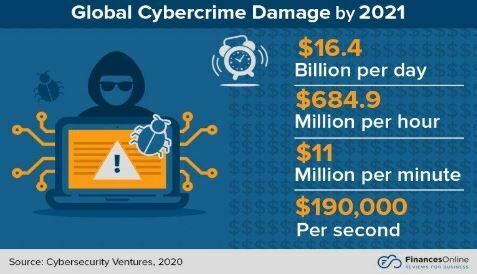Most experts believe FTX’s collapse will be well-contained within the cryptocurrency industry.
They believe it will not be a contagion to the greater financial markets.
However, many experts also agree that the estimated loss of some $8 billion by FTX is only the tip of the iceberg as to what will happen next in the growingly sophisticated arena of cybercrime.
According to Daniel Taylor, director of the Wharton Forensic Analytics Lab, “In the future, if regulators fail to embrace analytics as aggressively as sophisticated fraudsters do, the frauds will get bigger, persist for longer, and be more devastating.”
This doesn’t give mom-and-pop investors on Main Street a warm and fuzzy feeling. The financial toll surrounding global cybercrime is staggering. According to Cybersecurity Ventures, cybercrime wipes out over $16.4 billion in value each day.

Many like Professor Taylor believe that the private sector along with governmental regulatory agencies must utilize advanced analytics in an attempt to avert future scandals. As new information comes to light regarding the FTX debacle, it appears that stricter regulatory checks and audits may have foreseen the collapse that ensued.
In addition to the huge cost of such crime, the money needing to be allocated to prevent it is also enormous. Regulatory-wise, the Securities and Exchange Commission’s 2022 budget of $2.7 billion is modest compared to JP Morgan, who alone spends $12 billion annually on technology, and the entire financial sector may have a combined annual outlay of some $100 billion.
As one might expect, the government can’t be expected to keep up with the financial budgeting necessary to prevent these crimes.
The only hope is efficiency.
This would mean embracing data and analytics to try and ferret out any potential wrongdoing. Pay attention to my techy nerd friends out there, as this will be an area of entrepreneurial opportunity going forward.
The use of analytics in finance has also brought other gains, such as growth and new efficiencies to markets, and expanded household access to financial products, thereby leveling the playing field for them in many ways. So how does that benefit you and I.
Well, for one, among households, we’re seeing improvements in budgeting, retirement savings, asset allocation, and credit usage, due largely to the democratization of data and technological innovation from fintech. This was really unheard of before the availability of fintech technology.
The problem going forward is the same as that of the past.
How to allocate capital efficiently to increase shareholder wealth. All this nonsense about corporations and community diversity, et al, instead of profits will be a short-lived failed experience.
It takes money to make money, and the market goes down for all investors, not just those greedy oil companies, but especially for those who use corporate profits to put transgender bathrooms in the local Girl’s and Boy’s Clubs instead of making more profitable widgets.
So how do we scale up efficiently to combat these dregs? Financial analytics and AI in finance will help level the playing field against the bad guys. They are bad guys, right? Or possibly they just couldn’t help committing these cybercrimes because they didn’t have access to an Apple laptop in elementary school and a safe space to cry at in college.
All valid socialist reasons for crime in other areas. Why not financial fraud? But I digress.
In order to avoid past mistakes and prevent future financial collapses, money allocated towards this end needs to be viewed as an investment by corporations.
As it typically plays out, the large, well-capitalized firms will have the initial advantage, thus giving their clients a leg up on safety. Whether it actually trickles down in an altruistic manner is yet to be seen.
There are examples of such with AI and financial analytics. Two that come to mind are inexpensive and widely available Robo-advisors, as well as electronic payment systems. These and other cutting-edge tools will become available to regular households as the competition enters the market making the cost essentially negligible for the user.
This is good for small and medium-sized businesses too, where financial analytics will be used in areas like capital budgeting and resource allocation.
There will always be bad guys in the marketplace who use their sweat equity 24/7 to try to beat the system. However, with the growing acceptance and innovation of financial analytics as a tool to combat coercion, hopefully, the nefarious gains will be singles instead of doubles and home runs.











